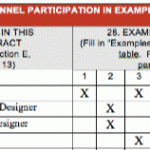Finding and booking speaking engagements can seem difficult, especially when you are just starting out. And for some of us, just thinking of getting in front of a crowd to present makes our knees all wobbly.
But it doesn’t have to be like that.
On my journey to becoming a paid keynote speaker, I made a lot of mistakes. I want to help you avoid those mistakes and make it easy for you to not only book speaking engagements…but crush them.
I wrote this guide to demystify the whole process…
…to help you understand the game being played…
…and to give you the tools and strategies you need to become a sought-after public speaker.
Even if you hate the idea of speaking in front of an audience, this guide might just change your life.
My Wife Punked Me
Sometimes all logic points to you coming out on top, but it just doesn’t work out for you. However, it’s funny how these situations can actually improve your life.
Let me give you an example.
I love my wife to death. Everybody loves Molly. People, for no reason at all, have actually threatened me with violence if I was to ever do anything to hurt or anger Molly…
…and those were just my coworkers.

(Best thing to happen to my life, the worst thing to happen to my ego)
To say Molly likes to beat me is an understatement. She loves to one-up me in everything. Whether it’s career, sports, or Uno…she’s in it to win it. And in the rare case that I beat her at something, I can’t even enjoy it. The first time I beat her in a 5K race, she got outrageously mad at me.

(She’s even a better painter)
But there was one thing I was convinced I would be better at.
Award-Winning Speaker
Many years ago, I wanted to check out the local Toastmasters group. Toastmasters is an organization that helps people with public speaking. I wanted to become a better public speaker.
Molly reluctantly agreed to tag along for moral support. In fact, I pretty much dragged her there. She had no interest in public speaking.
But I was ready, excited, and determined to become a great public speaker. I practiced anywhere I could and to any person, shower, or tree who would listen.
That night, we both got up (along with many others) and did impromptu speeches. At the end of the night, they provided an award for the best new speaker.
And Molly was given a medal as the best new speaker.
What?!?! She’s the researcher. I’m the business development guy. She didn’t even want to come!
Today, Some Of The Largest Firms Hire Me To Speak
Sometimes small failures are the world’s way of telling you to step up your game. After that night, I joined a Toastmasters group and participated for several years. I became a much better public speaker.
And I finally got a trophy.

Maybe Molly’s speech on that fateful Wednesday evening was better than mine. Or maybe she bribed and/or threatened the judges. We’ll never know for sure.
But that heartbreaking loss served as the catalyst that brought me to where I am today.
Nobody Starts Out Great At Anything
Nobody is born a great engineer, marketer, proposal writer, public speaker, skateboarder, or janitor. You need to develop and refine those skills over time. But first, you need that “aha” moment that inspires you to make it happen.
Your Toughest Competitor Can Be Your Greatest Inspiration
It’s those who beat us who inspire us to do great things. And that’s not just something my grandfather said as he beat me with his belt.
Who would Magic Johnson be without Larry Bird? What would Apple be if it weren’t for Microsoft? Who would Tom be without Jerry? And who would I be without Molly?
Be inspired by your competitors.
Find Your Why
The first step to becoming a great presenter is finding your inspiration, something that will drive you towards that stage. Do you want to change the world or the lives of your audience?
Do you want people to see you as an expert? Do you want to be respected?
There is no wrong answer. Find that thing inside of you that is going to drive you towards that stage.
Then Get Ready To Play
Public speaking is a competitive sport. Your “why” will get you to the stage. But once there, you need to tap into your competitive spirit to stand out from the crowd.
Don’t worry, I’m going to show you exactly how to become better than 99.9% of all speakers…even if you’re not the most articulate person in the world.
The 3-Step Shortcut To Becoming An Award-Winning Speaker
So, my greatest nemesis pulled the rug out from under me and took away an award that should have been mine. But at the same time, she inspired me to do what I had to do to become an award-winning public speaker.
You Need Public Speaking Skills
You might be thinking, “Matt, I have no desire to become a public speaker. I’m introverted. I just don’t feel comfortable around people. And I certainly don’t want to get up in front of them and talk.”
Well, join the club. Many successful speakers are introverts. But they’ve realized that public speaking was a key skill they needed to take their career or business to the next level.
And thus, I present you with:
The Roadmap To Becoming An Award-Winning Speaker
You may trip over your words. You might struggle to get out of bed and face the world in the morning. But with a few steps, I believe anyone can become a public speaker.
Just follow this roadmap.
Find Safe Places To Practice Your Public Speaking
Toastmasters is a great example of a safe environment to practice your public speaking. Internal events may be another. It may sound overly simplistic, but to become a great public speaker…you need to do more public speaking.
What’s great about Toastmasters is that every speech you do gets evaluated. Every “um” and “ah” gets counted. In fact, I believe nobody has beaten my state record for the most ums in a speech.
But everybody in Toastmasters is there to help you. They clap for you. They support you. They create a safe environment for you to speak. While it might seem cheesy at first, it’s how a lot of people get started with public speaking.
You can even start a Toastmasters group within your own firm.
Be Authentic But Crank Up The Energy 200%
If there is one downside to Toastmasters, it is that they teach you to over exaggerate your words, motions, etc. And that can make you seem fake.
You don’t want to be some exaggerated character in front of the room. You want to be authentic. Let your personality come out. If you are a grumpy naysayer…be that during your speech. Be you.
Instead of over-exaggerating, just crank up the energy. The next tip will help with that. But you want to bring as much energy to the table as possible whenever you speak in a public setting.
And if you are doing a webinar, crank the energy up to 300%. It’s much easier for people to pick up on energy in a live setting than in a webinar. I learned that the hard way.
Speak About Things You Are Passionate About
I noticed something interesting while in Toastmasters. The first speech you had to do was an introduction speech. People would get up to do that first speech and would tell these emotional, heart-wrenching, stories.
One lady, who was the CEO of a major healthcare provider, told us how her son was born with one ear. She scoured the country to find a doctor that could give him an ear. And she did. But years later, as he grew up…that ear fell off. And no doctor would touch it. She finally convinced the original doctor to come out of retirement and help her son. That’s when she decided to get into healthcare.
Nine out of ten times, there was not a dry eye after one of those introductory speeches.
But their next speech would always be a snoozer. They didn’t choose topics they were passionate about. And when you are not passionate about a topic, it becomes obvious to your audience.
If you’ve spoken to architects and engineers, you can tell when they are passionate about something. It’s obvious. You want to find speak to those topics that are full of passion.
Becoming A Solid Public Speaker
Wait…that’s it?!? Yes, that’s the simple, three-step, roadmap that can help anyone become a great speaker.
Even if you decide public speaking is not for you, you can pass this roadmap on to anyone with interest in public speaking. If they follow through, they’ll thank you.
How To Find And Book Speaking Engagements
People tend to think getting speaking engagements is pretty tough. But it’s actually not…if you have the right approach. And that applies to getting speaking engagements for anybody.
Here’s a quick guide to getting speaking engagements for you or someone else.
Start With Local Organizations
Great speakers bubble up from the bottom. They get their feet wet in a safe environment like Toastmasters. Then they speak to local groups or organizations. Then they speak at conferences. Then you start seeing them on TV.
Don’t pitch your first presentation to the United Nations General Assembly and then be disappointed when they decline.
Start small. Refine your presentation by giving it to local organizations. If it gets traction, submit it to a national conference.
Be the speaker who bubbles up from the bottom.
Learn About The Audience
A common mistake speakers (and writers) make is they choose a topic they want to talk about. Why should your audience care about what you want to talk about?
Instead, your presentation has to be built around the audience’s pain points. Think of pain points as things that make people worry (or want to punch a wall).
What you’ll do is identify your audience’s pain points, identify one you are passionate about solving, and create a presentation that solves that problem. If you are not passionate about solving your audience’s pain points…find another profession.
And it’s nearly impossible to identify the pain points of a group of people without talking to them. Before you pitch your presentation topic, attend a few of the group’s events. While you’re there, be curious and ask questions.
Aside from learning the biggest challenges the membership is faced with, you need a sense of what presentations they’ve had over the last two years. No group will want the same topic they had a few months ago.
Learn About The Organization’s Politics
Politics are unavoidable when trying to book speaking engagements. Every organization or association chapter has its own set of politics surrounding how and why they select speakers.
For example, there are some national organizations where you can book a speaking gig with just by calling up the right person. And there are small local chapters that have a committee who select presenters. There are even legitimate industry events where you have to pay to speak.
Getting to know the decision makers and how selections are made can give you a major advantage when trying to get speaking engagements.
But keep in mind, politics can be tricky. You might have an amazing and original presentation. You may even know the person heading up the event. But if the politics are in someone else’s corner, you’re out of luck.
Craft A Unique Presentation That Solves One Of The Audience’s Problems
The topic of your presentation has to be compelling enough to get their attention. As someone who has “judged” presentation submissions for a large conference, I can tell you that events get lots of “me too” submissions. It’s the same old stuff you see again and again.
Your presentation topic has to be different. Now that you have a solid understanding of the audience, focus in on solving one of their most painful problems. The most compelling presentation topics make a big promise and deliver on it.
I often present to people in marketing or business development. Here are a few of my presentation topics (in image form).



What are the pains and challenges of your audience? How can you help them solve one of those challenges?
Consider Teaming Up Or Being On A Panel
My first industry speaking events were on panels or speaking with other, established, speakers. Starting this way takes a lot of pressure off you. And even today, I enjoy speaking with other the right people who can serve as the “ying to my yang.”
The Right Approach To Booking Speaking Engagements Is Key
If you use the right approach, securing speaking engagements is not difficult.
How To Make Sure Your Presentations Will Be Successful
This is what it’s all about.

The best presentations help your audience experience big wins. In this case, it was $750M in contracts. But helping your audience solve any burning pain, and seeing the results, will not just help you understand the value of public speaking…it can restore your faith in humanity.
And you might think after getting comfortable with public speaking…
…learning your audience’s pain points and the politics of selection…
…and building a refined presentation that solves your audience’s pain points…
…you’re finally done.
Well, I’m a firm believer that you are not done. And I believe the difference between the typical speaker and a top performer comes down to the following things:
Make The Event’s Success Your Top Priority
You may be one of several speakers at an event. You may think your job is to swoop in, present, and then swoop out. But what would you want from a speaker if you were hosting the event?
If you were the event’s host, what could the speaker do that would blow you away?
As a speaker, it’s your duty to make the event’s success your top priority.
This might mean:
- Personally reaching out to people, asking them to come out
- Attending before and after your speaking slot to meet the audience and answer questions
- Offering a giveaway to the organization
- Identifying sponsors for the event
I regularly do all these things for associations that bring me out to speak. If their event is not a success, why would they bring you back?
You’ve got to make the event’s success your top priority. So, spend a few extra hours to ensure the event knocks it out of the park.
Entertain The Audience First, Educate Second
This may sound counterintuitive, but it’s a point so many speakers ignore.
I am not the most articulate person in the world. If aliens were coming to destroy our planet, I’m not the person they would call to give an inspiration speech and band together the people of earth.
But if the leaders of the free world desperately needed a presentation on proposal writing that HAD to make people laugh…I think I’d be at the top of that call list.
A spoon full of sugar helps the medicine go down. And wrapping your presentation in entertaining elements helps even the most mundane topic get through to an audience.
I do a 3+ hour workshop on proposal writing. That’s a long time to sit in a workshop about the most boring topic ever. But I take extra measures to make the experience entertaining. I entertain first, educate second.
As a result, attendees learn a ton. They get results. But that’s only because they paid attention. And they only paid attention because I entertained them.
Get Quotes And Feedback From Attendees
There are two types of feedback you need from attendees. First, you need to observe the audience as you present. Which slides work? Which lines work? Which don’t?
When I was developing one of my presentations, I included a joke about a polecat. And I thought it might be a little much for a business setting. So, I tested it. For some audiences, I kept the joke in. For others, I left it out.
The slide with the joke worked much better.
You’ve got be constantly testing your material, refining it, and making it better.
Attendee quotes are the second type of feedback you need to capture. If nobody is willing to give you a quote on how great your presentation was, that’s a key indicator that something is wrong.
People might come up to you after a presentation, pat you on the back, and tell you that you did a great job. But how willing are they to put that in writing and have it posted where others can see?
In addition, attendee quotes help other people determine whether your presentation if right for them.
Here are some random quotes I’ve collected over the years.
“Of all the seminars, workshops, and lectures I’ve attended in my decade-long marketing career, yours was by far the most interesting and insightful.” – Jennifer Lawson
“I loved the exercise where we evaluated proposals as a group. It was extremely eye-opening.” – Glenn Hart
“I just wanted to say that I found today’s lunchtime learning lab to be, perhaps one of the best webinars I’ve heard to date. I’m new in the A/E/C industry and found Matt’s presentation to be totally engaging and SO useful! I’m so glad I signed up and I’m thrilled to start putting these new tactics to use.” -Lauren Hazirjian
“Bringing Matt out to our chapter was a great investment. It was one of the best events ever, it attracted many potential members we hadn’t seen before, and we walked away with a profit. I’m glad I took the advice of my fellow chapter presidents.” – Krystal Vickers
Make sure to get these two key pieces of feedback each time you present.
90% Of The Work
90% of the work that makes a presentation successful happens when your mouth is closed. Make the extra effort to go “above and beyond” every time you speak to an audience. engagements





[…] business development manager writes articles and books, blogs, speaks at conferences, and participates in relevant industry associations with the hope that people will perceive him/her […]